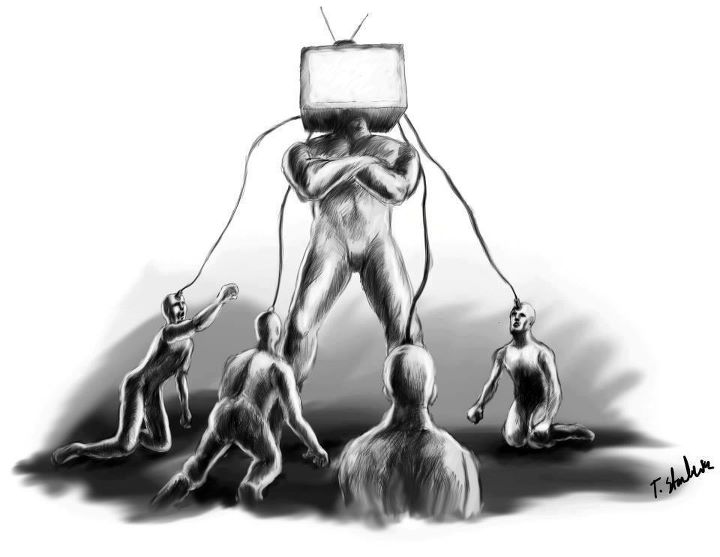
I remember as a young teen when I first heard the words, “Think for yourself and question authority.” It was a soundbite of Timothy Leary being sampled in the Tool song Third Eye – I was probably 13 or 14 at the time.
The swirling guitars and synthesized chaos of the song along with the inspiring words created an atmosphere that was probably as close to an “insightful” or “psychedelic” experience as anything else I had experienced up until that age. It felt meaningful and liberating.
And even today these words carry a lot of meaning to me. The mantra “think for yourself and question authority” speaks to a simple truth, which is: society isn’t always right, and you have to trust your own heart and mind at the end of the day, no matter what anyone else thinks.
Deep down I think I always believed that, but hearing it in the form of art and music made it finally click for me.
I think when you pay attention to a lot of other people in our society, most make a lot of their choices based on what they are told from others.
They don’t think for themselves, but instead adopt beliefs based on what parents, teachers, politicians, media, celebrities, and other perceived authority figures say they should believe. Many of us just mimic and regurgitate what society says is the best course of action.
As humans, we have evolved to be a very social species, so we are in many ways programmed to conform to the social norms of our “group” or “tribe,” whatever that may be. It used to be necessary to “fit in” to survive and reproduce with members of our tribe, and individuals who didn’t fit in were quickly ostracized, and most likely didn’t live too long afterwards.
But when you look at all progress throughout the course of our society and civilization, it always goes against the perceived norms of that society. If it were just conforming to the status quo, then it couldn’t be considered a change.
In this way, all social progress is by definition an act of rebellion. And every individual who thinks for themselves is making their own unique contribution to society.
Please keep in mind however, thinking for yourself doesn’t mean you don’t ever think or act in similar ways as other people. It means you just don’t follow others blindly. If you conform with others, it’s because you truly believe it’s the right thing to do, not because you are just trying to please others or you’re too afraid to stand up for yourself.
So how do you think for yourself? I can’t tell you that exactly, but I can give some guidelines and suggestions that I believe have helped me think more independently:
- Always be willing to step back and reflect on what you are told from others. Is what they say true? Do they use evidence and logic to back-up what they say, or are they just trying to win you over with emotions? Are there other possible ways of looking at the situation?
- Consume information from as many different sources as possible. The more different kinds of thinking you expose yourself to, the easier it is to find what you think makes the most sense. If you are only exposed to one viewpoint, then it’s unlikely you’ll be able to think outside of that limited perspective.
- Challenge your current beliefs. There’s a good chance that many of the beliefs you already have are influenced by society and your upbringing. Make sure you question your own thoughts and assumptions, you may have learned them at an early age when you weren’t fully capable of thinking for yourself yet.
- Stay “cognitively flexible.” No matter where you are in life, you’re never going to have all the answers. Make sure that you are always open to new information and willing to admit it when you’re wrong. Thinking for yourself means putting in the work to keep your brain sharp and updated, not just choosing your own beliefs, stubbornly clinging to them, and then never questioning them again.
- Write your thoughts in a journal/blog/diary. I personally find that spending a little time each day (or week) writing down your thoughts, feelings, and experiences to be a great way of introspecting on your own mind, becoming more familiar with your thought processes, finding potential flaws in your thinking, and making changes in your thinking so that it better serves you and your goals.
These are guidelines on how you should approach thinking, but it’s really up to you to take responsibility over your own thoughts at the end of the day.
I often say, “we should teach children how to think instead of what to think,” but really that’s something that everyone needs to learn at some point in their life if they haven’t already.
And don’t forget – all of this applies to this website too. I try my best to write from a general, objective point-of-view, but my ideas have their own bias to them like everyone else. If you don’t find yourself disagreeing with me sometimes, then you’re probably not fully thinking for yourself.
When it comes down to it, I’d rather someone thinks for themselves and disagrees with me rather than just follows what I say and agrees without question.
Enter your email to stay updated on new articles in self improvement:
